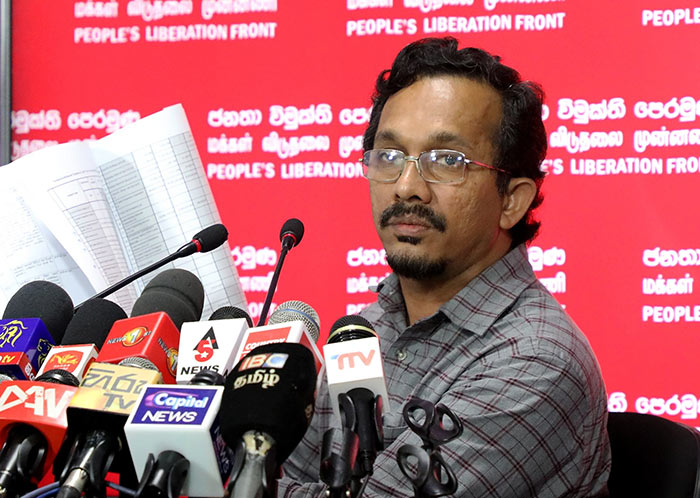JVP predicts crash of economy imminent, due to mismanagement

The 2020 Central Bank annual report presented to Parliament last week is a testimony to the fact that the country’s economy is in dire straits, says the JVP.
Addressing the media at the party headquarters in Pelawatte yesterday, JVP Politburo member and former MP Sunil Handunnetti alleged that the government was using the funds meant for the development of the country for its projects to cling on to power. “The Central Bank report confirms many warnings we have been issuing in the recent past. The country’s economy is sliding into a recession and there would be a crash soon. The economy recorded a growth of -1.6% during the first quarter of 2020. That was before the onset of the pandemic. The situation worsened in the second quarter. The government is citing the pandemic as the reason for the sharp economic downturn.
“The impact of the pandemic on the economy is evident, but what we are experiencing is mainly due to the economic mismanagement. There are five main crises in our economy. The first is the loan crisis. The revenue received by the Treasury is not sufficient even to pay the installments of loans taken. To pay-back the due installments the country needs to borrow an additional 135 billion rupees. The total outstanding loans as at 2019 was Rs 14,115 billion. That increased to Rs 16,427 billion in 2020. The government has to pay 6.9 billion US dollars as loan repayments. The second is the import-export crisis.
“The government came into power promising to improve the production industry and bring down imports. We have sea areas, which eight times the country’s land masse, but we imported fish worth Rs 34,650 million in 2020. In 2010, we produced 27 percent of the onion requirement in this country; now it has dropped to eight per cent so that we have to import 92 per cent of the country’s onion requirement. We have imported Rs 27,610 million worth of salt, milk and milk products worth Rs 61,930 million. The third crisis is the weak government revenue. In 2016 the government income was around 23 per cent of the GDP. As at 2014 the figure dropped to 11.5 per cent. Now it’s at 9.1 percent.
“The fourth crisis is the collapse of the industrial sector due to the high cost of raw materials, failure to combine technological support with the industrial process and inability to create a proper market for industrial output. The fifth crisis is the inequitable distribution of national wealth.”
Of the total population, the top 10 percent of rich enjoy 38.4% of national income while 10 per cent at the bottom receive only 1.1 per cent of the national income. There is a huge tax burden on the people. This government promised to maintain 40 percent direct taxes and 60 percent indirect taxes. Yet now the indirect taxes are around 80 percent. Sri Lanka is the only country in the world with this much taxes on food consumed by the people. Even in India it’s 49 per cent, in Indonesia its 50 percent and in Thailand it is at 40 percent.”
JVP Central Committee Members Wasantha Samarasinghe and Nalin Hewage also addressed the press.
(Source: The Island – By Saman Indrajith)
Latest Headlines in Sri Lanka
- Sri Lanka moves to strengthen fight against money laundering and terror financing February 3, 2026
- L.S.P. Jayaratne approved as Auditor General by Constitutional Council February 3, 2026
- Defence Secretary inspects Colombo Central Bus Terminal renovation February 3, 2026
- Popular actor Hemal Ranasinghe arrested February 3, 2026
- MILCO shows state institutions can be rebuilt by ending corruption: PM February 3, 2026



This guy should explain what he means by the ‘economy collapsing’?
The Chinks gave us a few Billions in USD to pay back the loans we owe to them
The Koreans gave us many millions in USD for building roads.
The country is well on its way towards ‘prosperity and splendour’.
Now it is focussed on building 500 Gymnasiums to keep people fit.
We have the best Econ Whizz, Cabaraala, as an advisor.
We have an excellent leadership in CB and Treasury.
Where is the collapse, my dear pal?